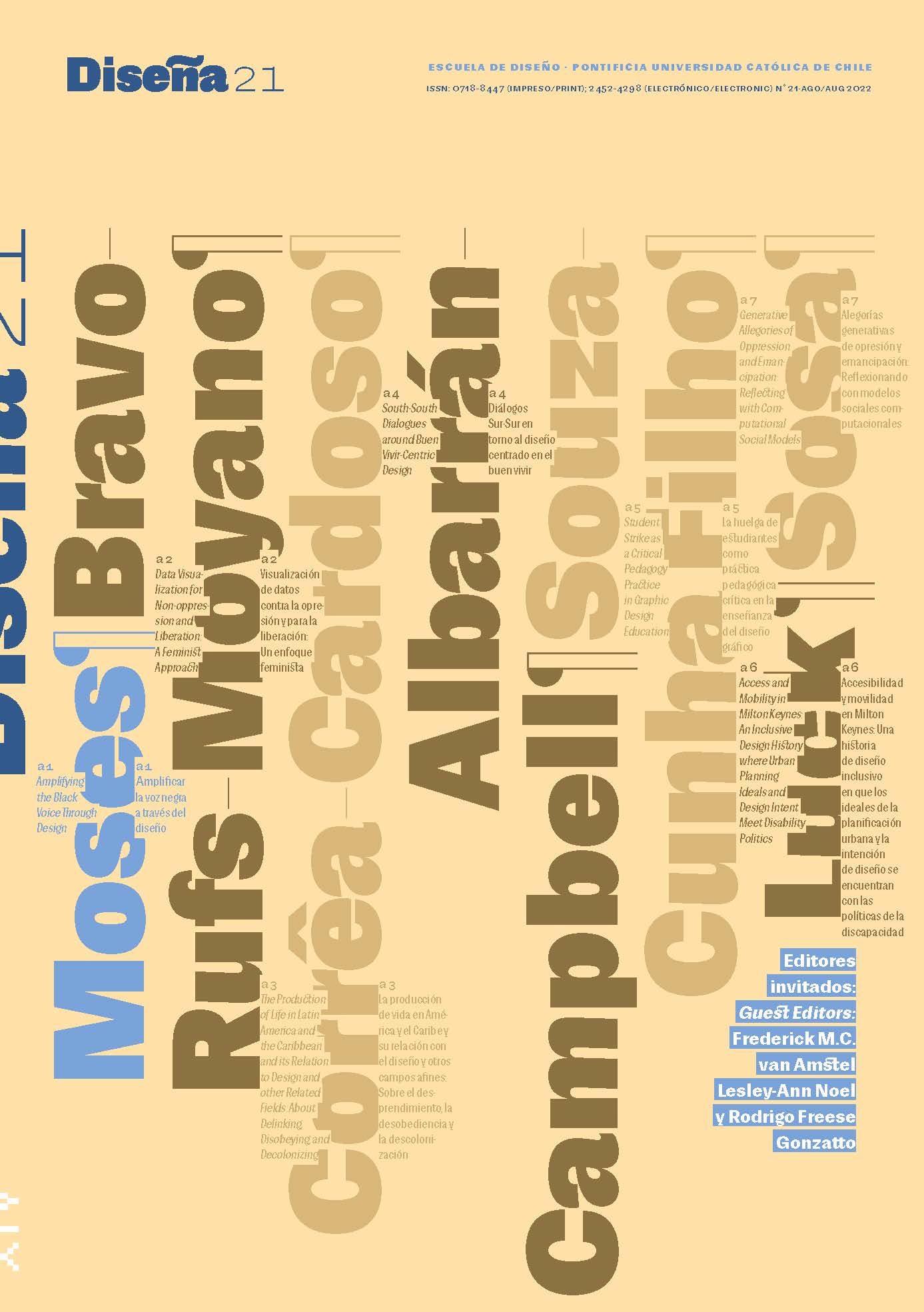Anti-oppressive Assessment Strategies for Design Teaching
Main Article Content
Abstract
This editorial aims to contribute to the discussion opened by the editors of this special issue by making visible the power dynamics that are implicit in evaluation strategies. It is argued that, by uncritically evaluating students, we not only reproduce patterns of social stratification but also legitimize them. Three strategies are proposed that could contribute to the adoption of liberating forms of assessment in the field of design education: self-assessment, freedom of format, and free assessment weighting. Beyond their instrumental value, it is emphasized that these strategies make power relations visible, opening a way to subvert them.
Downloads
Article Details

This work is licensed under a Creative Commons Attribution-ShareAlike 4.0 International License.

This work is licensed under a Creative Commons Attribution-ShareAlike 4.0 International license.
COPYRIGHT NOTICE
All contents of this electronic edition are distributed under the Creative Commons license of "Attribution-ShareAlike 4.0 Internacional" (CC-BY-SA). Any total or partial reproduction of the material must mention its origin.
The rights of the published images belong to their authors, who grant to Diseña the license for its use. The management of the permits and the authorization of the publication of the images (or of any material) that contains copyright and its consequent rights of reproduction in this publication is the sole responsibility of the authors of the articles.
References
Boud, D. (2000). Sustainable Assessment: Rethinking Assessment for the Learning Society. Studies in Continuing Education, 22(2), 151–167. https://doi.org/10.1080/713695728
Boud, D., Lawson, R., & Thompson, D. G. (2013). Does Student Engagement in Self-assessment Calibrate their Judgement over Time? Assessment & Evaluation in Higher Education, 38(8), 941–956. https://doi.org/10.1080/02602938.2013.769198
Broadfoot, P. (1996). Education, Assessment, and Society: A Sociological Analysis. Open University Press.
Brown, W. (2011). Neoliberalized Knowledge. History of the Present, 1(1), 113–129. https://doi.org/10.5406/historypresent.1.1.0113
Crabtree, S. A., Hemingway, A., Sudbury, S., Quinney, A., Hutchings, M., Esteves, L., Thompson, S., Jacey, H., Diaz, A., Bradley, P., Hall, J., Board, M., Feigenbaum, A., Brown, L., Heaslip, V., & Norton, L. (2020). Donning the ‘Slow Professor’: A Feminist Action Research Project. Radical Teacher, 116, 55–65. https://doi.org/10.5195/rt.2020.647
Cummins, J. (2003). Challenging the Construction of Difference as Deficit: Where are Identity, Intellect, Imagination, and Power in the New Regime of Truth? In P. P. Trifonas (Ed.), Pedagogies of Difference: Rethinking Education for Social Change (pp. 39–57). Routledge.
Filer, A. (2000). Assessement: Social Practice and Social Product. Routledge.
Foucault, M. (1995). Discipline & Punish: The Birth of the Prison (A. Sheridan, Trans.). Vintage Books.
Freire, P. (1997). Pedagogía del oprimido. Siglo Veintiuno Editores.
Godwin, S. E., & Ward‐Edwards, C. (2018). Participatory Assessment: Enlisting Community Partners to Facilitate Boundary Spanning, Reflexive Student Activism, and Institutional Change. In D. E. Lund (Ed.), The Wiley International Handbook of Service-Learning for Social Justice (pp. 415–436). Wiley.
Hanesworth, P., Bracken, S., & Elkington, S. (2019). A Typology for a Social Justice Approach to Assessment: Learning from Universal Design and Culturally Sustaining Pedagogy. Teaching in Higher Education, 24(1), 98–114. https://doi.org/10.1080/13562517.2018.1465405
Illich, I. (1973). Deschooling Society. Harrow.
King, C. J. (2018). Service‐Learning as Power Analysis in the Humanities. In D. E. Lund (Ed.), The Wiley International Handbook of Service-Learning for Social Justice (pp. 437–455). Wiley.
McArthur, J. (2016). Assessment for Social Justice: The Role of Assessment in Achieving Social Justice. Assessment & Evaluation in Higher Education, 41(7), 967–981. https://doi.org/10.1080/02602938.2015.1053429
Quijano, A. (2014). Cuestiones y horizontes: De la dependencia histórico-estructural a la colonialidad/descolonialidad del poder. CLACSO.
Reitenauer, V. (2019). “A Practice of Freedom”: Self-grading for Liberatory Learning. Radical Teacher, 113, 103–105. https://doi.org/10.5195/rt.2019.612
Ruggerone, L., & Stauss, R. (2022). The Deceptive Mirror: The Dressed Body Beyond Reflection. Fashion Theory, 26(2), 211–235. https://doi.org/10.1080/1362704X.2020.1766228
Spademan, T. B. (1999). Radical Pedagogy and the Logic of Assessment. The Radical Teacher, 56, 26–29.
Taylor, A., Glick, S., & Peikazadi, N. (2018). Service‐Learning and the Discourse of Social Justice. In D. E. Lund (Ed.), The Wiley International Handbook of Service-Learning for Social Justice (pp. 29–51). Wiley.
Walker, M., & Nguyen, T. (2015). ‘Capabilities-friendly’ Assessment for Quality Learning. South African Journal of Higher Education, 29(4), 243–259. https://doi.org/10.20853/29-4-504

